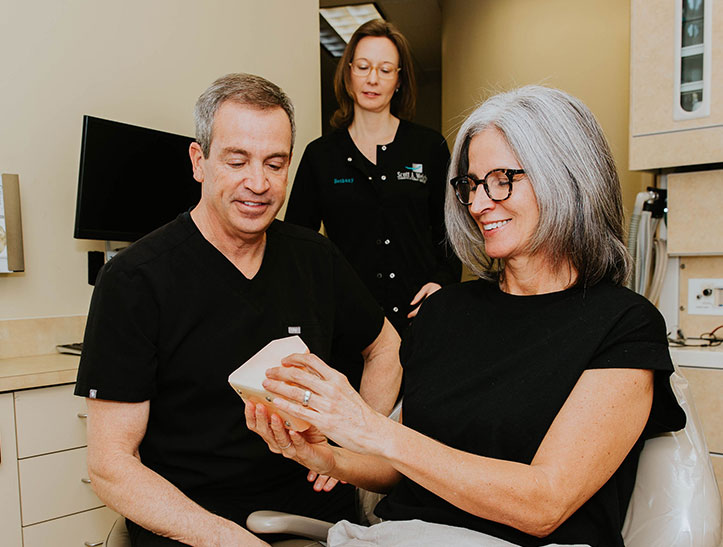DENTAL SERVICES
COSMETIC DENTISTRY


 Dentures replace missing teeth and will give you the confidence to have a great smile once again. There are two types of dentures: complete dentures, used when all teeth are missing; and partials, used when some natural teeth remain.
Dentures replace missing teeth and will give you the confidence to have a great smile once again. There are two types of dentures: complete dentures, used when all teeth are missing; and partials, used when some natural teeth remain.
Complete dentures are made after all teeth have been removed and the gum tissue has had time to heal. It’s a long process, as it generally takes about 8 - 12 weeks after the teeth are removed to have the final dentures created and in position. While waiting for the complete dentures to be created and the gums to heal, immediate dentures can be made in advance and applied the same day the teeth are extracted. Therefore, you don’t have to go without teeth for the entire time your complete dentures are made and your gums heal. Immediate dentures should only be used as a temporary solution, as the gums may change shape while they’re healing, so they’ll need to be adjusted often.
Partial dentures are used when there are only a few missing teeth and natural teeth remain. They adhere to the natural teeth beside them via a metal bracket to hold them in place. Not only does it fill in the gap of the missing teeth, but also bypasses the remaining teeth to shift.
Our patients often ask questions on various topics, and we have listed some of the most common questions for your interest. If you don't see the information you're looking for, give us a call at (336) 288-4499 so our team can help you get your questions answered.
Dentures take a few weeks to create and a few returns to the dentist office for the proper fitting of your new appliance.
1. The dentist makes impressions of your jaw.
2. Molds of the dentures are created for you to try on before the final dentures are made. After each fitting, adjustments are made until a final denture is cast.
3. The final denture is made.
4. Final adjustments are made.
An alternative to dentures is dental implants, which look and feel like natural teeth. Dental implants snap into a metal fixture attached to your gums and eliminate the need to extract all of your natural teeth that remain on the upper or lower jaw.
Eating and speaking will take time to get used to with your new dentures, but it will get better with practice and patience. You may have trouble pronouncing certain words, which may help you practice saying them aloud.
It may be challenging to get used to eating with your new dentures. First, start with soft foods that are cut up into small pieces. Next, avoid hot, hard, sharp, or sticky foods. Lastly, please don’t use a toothpick while wearing your dentures to prevent damage.

If you have any questions, or would like to make an appointment, call our professional dental team at (336) 288-4499.